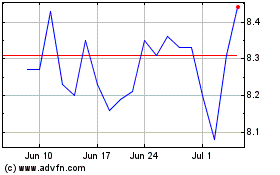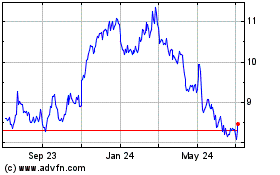Telecom Italia's (TIT.MI) renewed focus on Argentina and Brazil
highlights the importance of South America to European telecom
operators for future business development and profit
generation.
Italy's incumbent telecom operator Thursday reached a settlement
with the Argentine Werthein family to increase its interest in
Telecom Argentina SA (TEO)--if domestic regulators approve the
transaction--in a move that could lead to an integration with TIM
Participacoes SA (TSU), its Brazilian mobile unit.
The settlement, of which there are no financial details, follows
months of negotiations between the two parties which were locked in
battle over their joint ownership of Sofora, the unlisted holding
company that indirectly controls Telecom Argentina.
"Under the agreement Telecom Italia will continue to cooperate
with the Werthein family in the management of the Argentinian
company," Telecom Italia Chief Executive Franco Bernabe told Dow
Jones Newswires in an interview. The Argentine government has
previously pressured TI to sell its stake in Telecom Argentina
claiming the local market has become a monopoly because the Italian
company is partly owned by Spain's Telefonica SA (TEF) which in
turn owns Argentine telecom company Telefonica de Argentina SA
(TAR).
TI's agreement follows a similar move by Spanish rival
Telefonica which last week paid EUR7.5 billion to buy out Portugal
Telecom SGPS SA's (PT) stake in Brazilian mobile operator Vivo
Participacoes SA (VIV) after a protracted battle for control of the
company. PT used the proceeds of the sale to buy a 22.4% stake in
Brazilian telecommunications company Oi (TMAR5.BR), in a clear sign
of how important the high-growth South American market is becoming
for European operators who face stagnating growth in their mature
home markets.
The high price that Telefonica paid for Vivo--it upped its offer
for the stake three times before it was successful--has indirectly
boosted the value of TIM Brazil.
But Bernabe ruled out taking advantage of the implied higher
valuation through a possible sale of the unit, insisting that the
region is a crucial part of future strategy. "We are focusing on
this high-growth region at the moment," he said.
Bernabe said he is not concerned about Telecom Italia's
relationship with Telefonica, which is its key shareholder but also
its competitor.
"Telefonica is a fierce competitor in South America and an ally
in Europe," Bernabe said adding that in Europe "the
telecommunication market needs to consolidate in order to become
much more efficient."
But Bernabe said the possibility of merging with another
European peer was unequivocally "not on the agenda."
Spanish telecoms giant Telefonica is the single largest
shareholder in Telecom Italia through Italian unlisted holding
company, Telco. Telco controls a 22.5% stake in Telecom Italia and
includes heavyweights Assicurazioni Generali SpA (G.MI), Intesa
Sanpaolo SpA (ISP.MI) and Mediobanca SpA (MB.MI).
But Telefonica is also TI's main rival in Brazil and in
Argentina.
Reports of a possible merger between TI and Telefonica
circulated last year but were curtly dismissed by both companies.
Since the pair formed an alliance in 2007, there has been constant
speculation that a formal merger could boost profits of the Italian
company in the medium term.
Bernabe, 62, who has a passion for hi-tech tools like his new
iPad, has been at the helm of Telecom Italia for less than three
years. He has started increasing the debt-laden company's strong
cash flow by cutting costs and debt and strengthening its mobile
and fixed operations in the core markets of Italy and South
America.
After Telecom Italia suffered from a series of ineffective
strategic plans, Bernabe's industrial plan for 2010 to 2012 seems
to be starting to bear fruit. At the end of June 2010, the
company's closely-watched net debt fell to EUR33.5 billion, close
to its target of EUR32 billion although the aim is to reduce it to
EUR29.5 billion by 2011. "We are on track to reduce the debt of
Telecom Italia as per our target also thanks to the strong cash
flow generation," said Bernabe who ruled out the possibility of a
short-term asset sale to reduce the debt burden.
"Telecom Italia doesn't need to plan a bond issue in the next
months either thanks to its strong balance sheet," he added.
While growth in South America seems assured, it is the dwindling
home market of Italy that remains of concern to the company,
although Bernabe is resolutely upbeat.
He reckons that "the top line is still weak in Italy mainly
because of the company's repositioning in the mobile sector" but is
confident it will improve in future quarters. "The only weak spots
in the Italian mobile sector will be fixed in coming months," he
added.
Telecom Italia Thursday posted a 22% rise in second-quarter net
profit as cost-cutting helped offset competitive pressure on
fixed-line and mobile revenue in its core Italian market.
Cutting costs has been a key issue for the company, which
Wednesday sealed an agreement with local unions to cut 3,900 jobs
through voluntary redundancies over the next three years. The deal
will lead to a net provision of around EUR240 million for the year,
but Bernabe noted that the agreement takes advantage of existing
welfare tools and is in line with Telecom Italia's broader
reorganization plan. "There won't be more restructuring in Italy
and Brazil until the end of the current 2010 to 2012 industrial
plan," he said.
Next on the agenda at home is increasing wireless broadband
capacity although Bernabe dismissed suggestions that Italy's mobile
network risks collapse because of the rising popularity of
smartphones and the increase in data traffic.
"Current capacity is more than sufficient to meet the growth in
traffic," Bernabe said adding that Telecom Italia is already
addressing concerns with its "long-term plan to upgrade mobile
network infrastructure."
Italy's telecommunications regulator has urged operators to work
together to develop a fast fiber-based network, warning that
failure to do so could be costly for the country's economic growth
and competitiveness as Italy lags the rest of Europe in broadband
penetration.
But Telecom Italia recently dismissed calls to join a rival
broadband project and said it will push ahead with its own plans to
offer 100 megabits per second broadband to 50% of the Italian
population by 2018, and to invest EUR9 billion in its network
infrastructure by 2012.
"Telecom Italia has the responsibility to create the
infrastructure for the country, which we are doing already, and is
increasingly injecting resources into the network," said Bernabe,
although he added that the company is "open to discuss the
possibility of sharing infrastructure that makes commercial
sense."
Under a rival plan, Fastweb SpA (FWB.MI), Vodafone Group PLC
(VOD), Wind SpA and Tiscali SpA (TIS.MI) aim to invest a combined
EUR2.5 billion to bring broadband to Italy's 15 largest cities in
the next five years.
Company Web site: http://www.telecomitalia.it
-By Sabrina Cohen, Dow Jones Newswires, +39 02 5821 9906;
sabrina.cohen@dowjones.com
Telefonica Brasil (NYSE:VIV)
Historical Stock Chart
From Apr 2024 to May 2024

Telefonica Brasil (NYSE:VIV)
Historical Stock Chart
From May 2023 to May 2024
